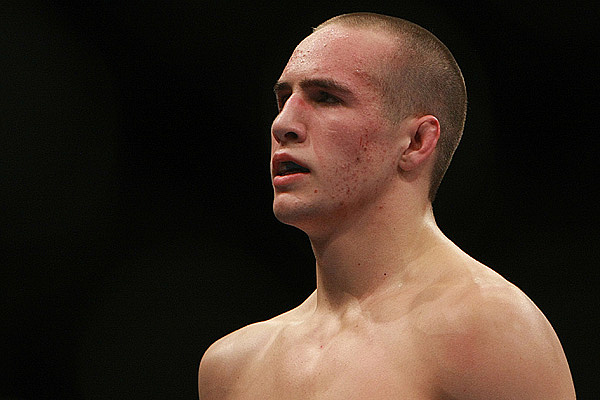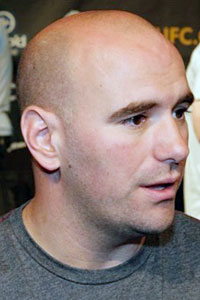UFC 115 Postmortem: Liddell’s Finale, ‘Cro Cop’ Comes Back, More
Jake Rossen Jun 14, 2010

Rory MacDonald File Photo: Sherdog.com
If you ever needed any proof that a fight isn’t over until it’s over -- and in Paul Daley’s case, not even then -- UFC 115 should be plenty proof enough.
Advertisement
The most common explanation for these rallies is that there are simply too many ways to lose in mixed martial arts. But it’s not just that: it’s that there are too many decisions to be made in the heat of the moment, and any one of them could wind up scalding you. Fighters are heckled when they have an opponent hurt and don’t go in for the kill (Barry simply stared at Mirko after dumping him on his butt), but racing in and committing to an attack has problems of its own (Liddell ate that KO right after trying to swarm a stumbling Franklin).
Anyone can strategize over a period of days or weeks, but making
the right commitments in the moment is what separates the
contenders from the stepping stones. If MMA is “kinetic chess,” as
some say, it’s really more a game of speed chess, with no luxury of
time involved. Having skill is only as important as being able to
deliver it at velocity.
That’s one of many reasons Liddell will never see the inside of the Octagon again. (His retirement is really the first among the Zuffa-era box office attractions.) It’s easier for some fighters to walk away when the money is blue-collar and the audience is lukewarm; it’s going to be harder for men like Liddell who will miss the adrenaline dump of having 15,000 or 20,000 fans happy to see him. It’s not the competition they love so much as the arena.
Some styles age well, and some don’t. Liddell’s does not. Hopefully the peers that will keep him out of the ring tomorrow will have the same conviction a year or two from now.
Next for Liddell: Retirement, unless the UFC wants to be perceived as sadistically as Pride and Dream have been for allowing Kazushi Sakuraba a wheelchair-accessible ramp to the ring.
Next for Franklin: If he wants a proper run at the 205-pound title, fights with Ryan Bader or Jon Jones would be a start.
Next for Barry: Less of the gee-whiz reverence toward opponents and more of the killer instinct he delivers sermons on (“I don’t hit hard -- I hit scary”). Fighting Todd Duffee would guarantee one of them gets back on track.
Next for Filipovic: He looked good but not great against Barry; a rematch with Antonio Rodrigo Nogueira is more their speed at this point.
The UFC-as-Religious-Experience Award Mike Goldberg, for declaring fans “blessed” by the idea of seeing Chuck Liddell compete again. (Admittedly, Midnight Mass with alcohol allowed could be a hard thing to argue.)
The Unnecessary Prep Award Matt Wiman, for needing notes stuffed into his fight shorts to remember to thank God and family for his victory.
The Devaluing Your Own Product Award Dana White, for repeatedly insisting that “Cro Cop”/Pat Barry wouldn’t hit the ground. Why not have someone stand by to administer an electrical shock every time they hit the floor?
The Misplaced Gratitude Award Goldberg, for thanking Vancouver for the fastest sellout in company history. Scalpers get no respect.
The Wait, One More Goldbergism Award Goldberg, for referring to Ben Rothwell as a “longtime MMA veteran.”
Does Liddell know he’s done?
With a new build that backed claims he was in serious training for a comeback, Liddell showed encouraging signs of a late-model revamp Saturday: he threw kicks, shot possibly his first first-round takedown in his UFC career, and generally looked like a man on a new mission. All of it nearly won him the round against Rich Franklin -- save for a last-second flush right that collapsed him.
Liddell’s ability to absorb a shot is gone, but what he may debate is how good he looked before getting caught. Mixing it up and coming on strong could be the worst thing to happen to him if it encourages him that he’s on the right track. He isn’t.
Is officiating actually getting worse?
In the wake of some highly questionable judges’ calls in recent memory, in-ring officiating at Saturday’s card was an assembly line of Three Stooges-level slapstick. Yves Lavigne pried Wiman off of Mac Danzig despite Danzig being completely alert and even having the physical presence to post off of Wiman’s thigh to relieve the pressure on his neck; Ricardo Funch received a warning for trying to “kick” Claude Patrick in the head (he wasn’t). If state commissions aren’t mandating a certification course -- and regular license renewal tests -- then it’s time they start.
When you improve one aspect of your game, does the other one suffer?
For years, Gilbert Yvel had the reputation for being hell on the feet and a pushover on the ground. Against Ben Rothwell, he displayed vastly improved defense, but couldn’t seem to punish Rothwell standing with the same ferociousness his older, one-dimensional version displayed. Budgeting time and knowing when you’re neglecting on the skill that brought you to the ring is another consideration -- among hundreds of little decisions -- that fighters need to sweat.
Is Bud Light dipping into MMA one toe at a time?
Since signing on to be a company sponsor in 2008, Bud Light has maintained a curiously distant attitude about saturating their marketing with a UFC presence. Instead of commercials featuring fighters, promotional displays of Anderson Silva and Liddell were under limited distribution; a 90-second commercial during a Spike prelim special Saturday had a bunch of generic dudes making only vague reference to “the fight” on television. MMA as a corporate darling is still a concept under construction.
Related Articles







